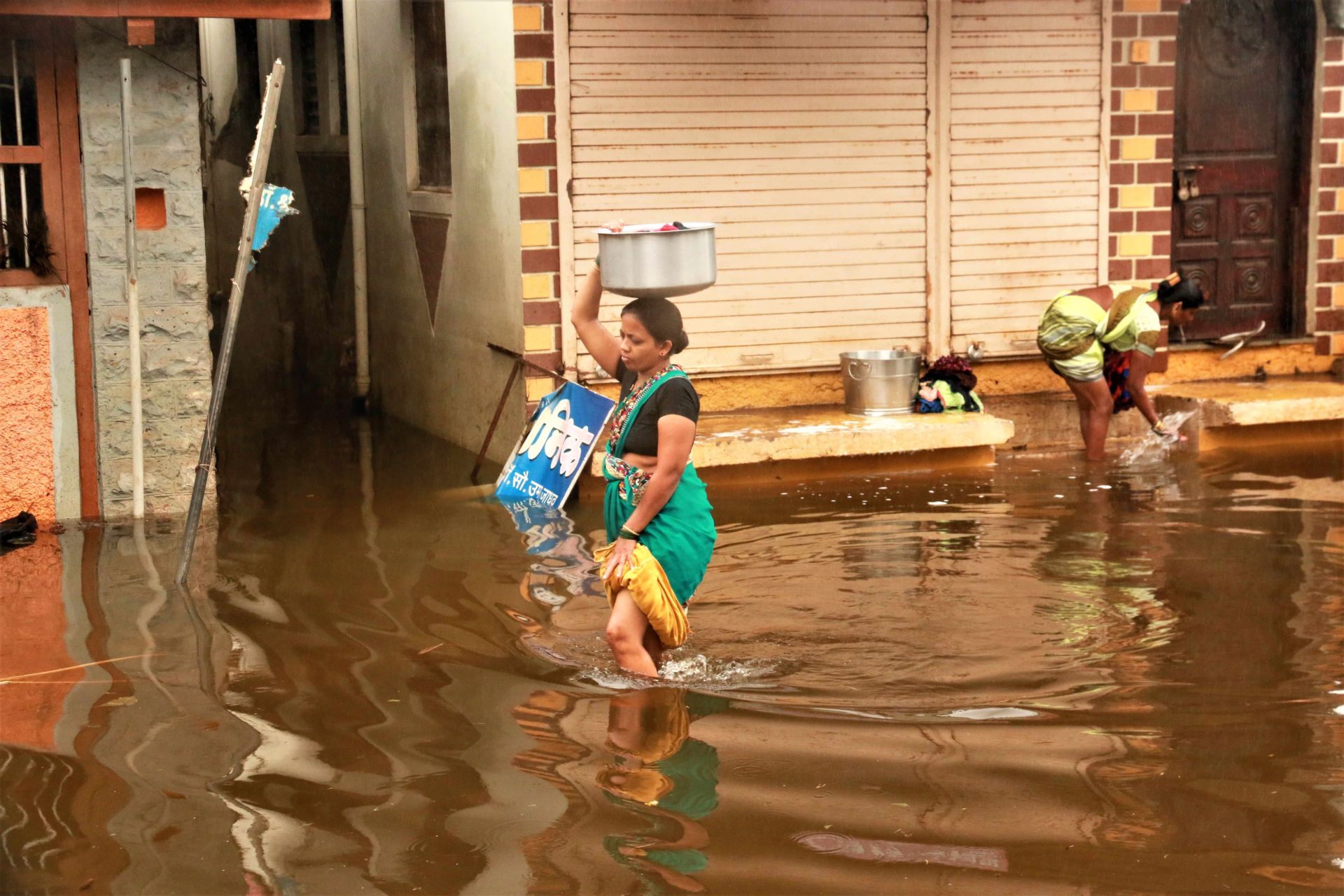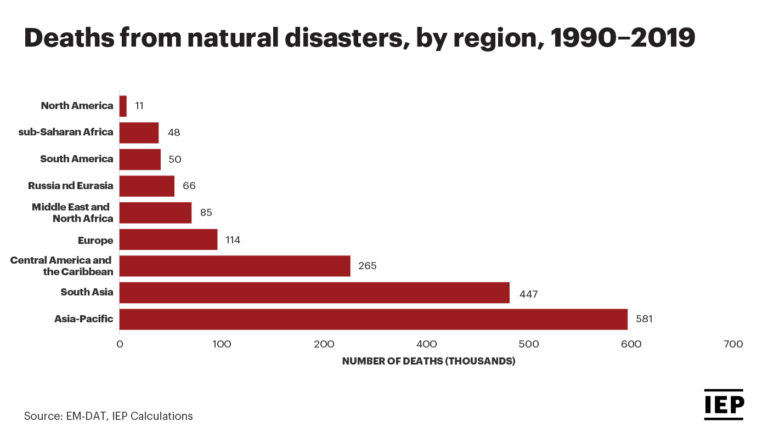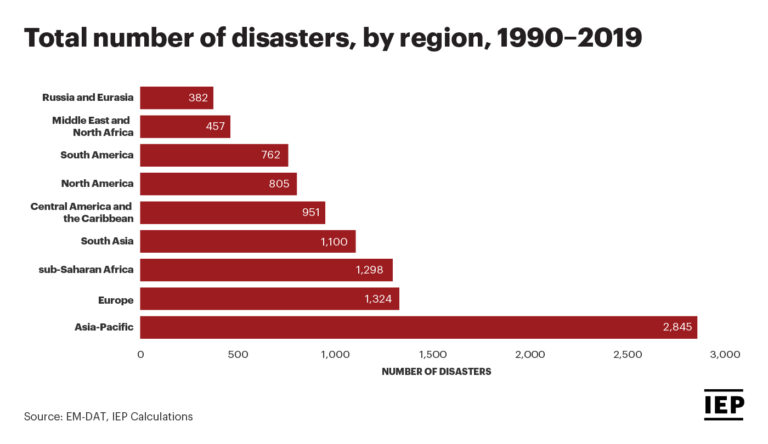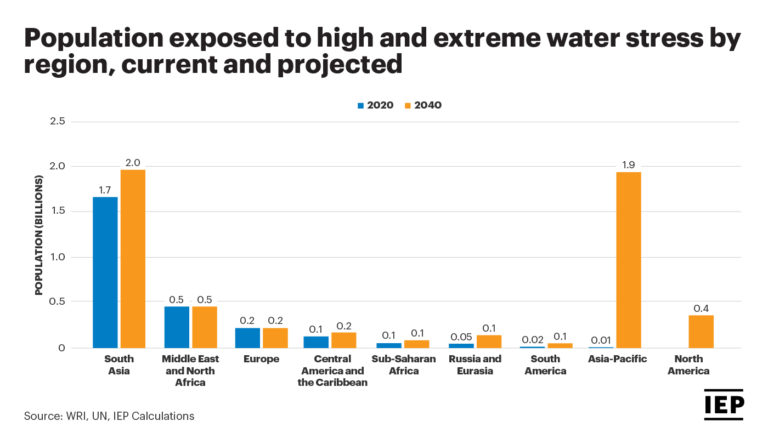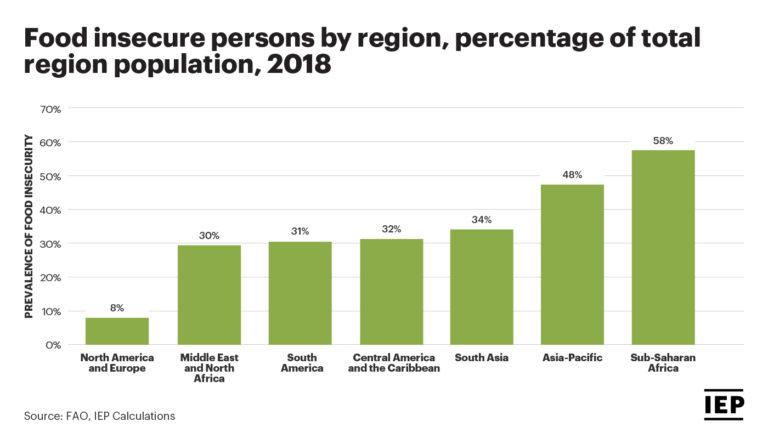A brief look into the Asia-Pacific region’s ecological threat profile.
The Asia-Pacific region has suffered the most natural disasters in the last 30 years, and it will witness a major increase in water stress over the next 20 years, according to the 2020 Ecological Threat Register (ETR).
While the region is labelled as a medium risk group of countries according to the ETR, with no country exposed to more than three ecological threats, it maintains a notable threat profile with flooding posing the biggest risk to 13 out of the region’s 19 countries.
Understanding the threats facing countries and regions allows for preparation and resilience building. The ETR shows that ecological threats and climate change pose serious challenges to global development and peacefulness and that the adverse impacts will disproportionately affect the world’s poorest and most vulnerable populations. Building resilience to ecological threats will become increasingly important and requires substantial investment.
Natural disasters
Asia-Pacific is the most affected region, with 29% of global natural disasters occurring in the region in the 30 years to 2019. The region was exposed to the largest number of natural disasters with 2,845 events in the last 30 years.
Floods and storms make the largest share of the total natural disasters in the Asia-Pacific at more than two thirds of the total. The most affected countries in the region are China, the Philippines, Indonesia, Japan and Vietnam.
While global data analysis shows that the number of natural disasters has drastically risen around the world – a tenfold increase since the 1960s – the Asia-Pacific region has been exposed to the largest portion of these events since the 1990s.
Water stress
Globally, 2.6 billion people are exposed to high and extreme water stress, with the majority living in South Asia and the Middle East and North Africa region. By 2040 this number will grow to 5.4 billion, driven by increasing water stress in the Asia-Pacific.
Water stress is projected to increase in the Asia-Pacific, mainly as a result of the rapid development of agriculture and manufacturing and more intense use of hydroelectricity.
Related Articles: Water Scarcity: How Climate Crisis is Unfolding in India | Your Search Engine’s Secret: The Gallons of Water Behind Data Consumption
Today, a majority of the countries in the Asia-Pacific region experience medium-level water stress. By 2040 an additional 1.9 billion of its inhabitants will be living in countries exposed to high and extreme levels of water stress.
Currently, only one country in the region suffers from high to extreme water stress — Singapore. By 2040, six additional countries within the region will also face the same level of threat.
China and Indonesia are two of the six countries that will transition into high or extreme water stress levels in the region, largely contributing to the 1.9 billion that will be living in countries exposed to high levels of water stress. The other four countries are Australia, Mongolia, the Philippines and Timor-Leste.
Displacement
The Asia-Pacific region recorded the highest number of new displacements between 2008 and 2019 with over 150 million as a result of climate-related hazards including droughts, extreme temperatures, seasonal floods and storms.
In 2019 alone, almost 25 million people were displaced in the Asia-Pacific region with China, India and the Philippines accounting for 53 percent of all displacements.
Food security
More than two billion people globally face food insecurity, defined as uncertainty in access to a sufficient quantity of food necessary for a healthy life. The global number of food insecure people has been on the rise, increasing by 300 million people since 2014.
Asia-Pacific has the second highest prevalence of food insecurity with 48% of the population deemed food insecure.
——
About the author: The article has been written by the Vision of Humanity Editorial staff — brought to you by the Institute for Economics & Peace (IEP). The IEP investigates the impact of COVID-19 and future trends in economics, politics, social dynamics, conflict and development.
Editor’s Note: The opinions expressed here by Impakter.com columnists are their own, not those of Impakter.com. — In the Featured Photo: Woman paving her way through a flood, Herwad, India. Featured Photo Credit: Wikimedia Commons.


